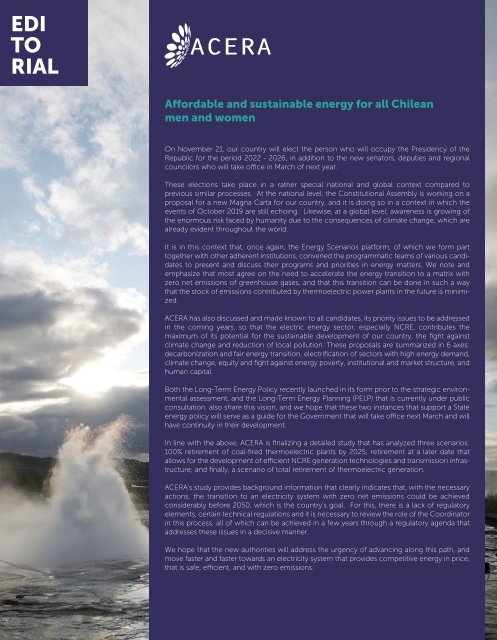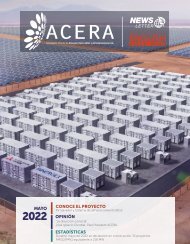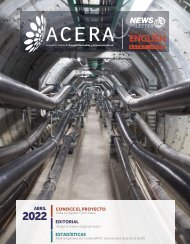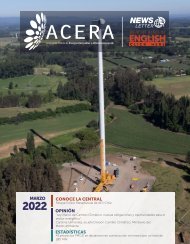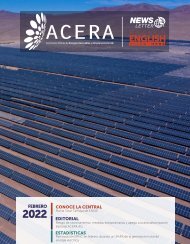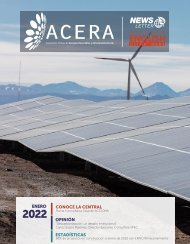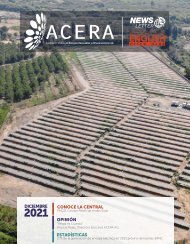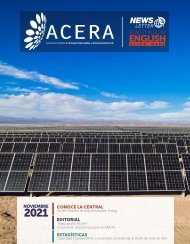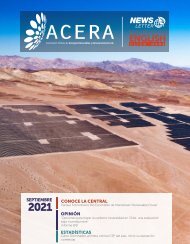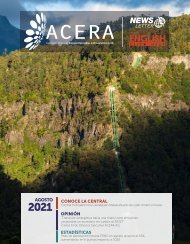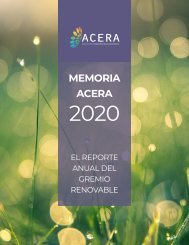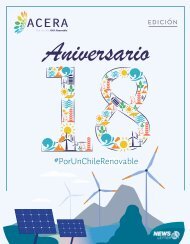Newsletter ACERA - Octubre 2021
You also want an ePaper? Increase the reach of your titles
YUMPU automatically turns print PDFs into web optimized ePapers that Google loves.
04.<br />
EDI<br />
TO<br />
RIAL<br />
Affordable and sustainable energy for all Chilean<br />
men and women<br />
On November 21, our country will elect the person who will occupy the Presidency of the<br />
Republic for the period 2022 - 2026, in addition to the new senators, deputies and regional<br />
councilors who will take office in March of next year.<br />
These elections take place in a rather special national and global context compared to<br />
previous similar processes. At the national level, the Constitutional Assembly is working on a<br />
proposal for a new Magna Carta for our country, and it is doing so in a context in which the<br />
events of October 2019 are still echoing. Likewise, at a global level, awareness is growing of<br />
the enormous risk faced by humanity due to the consequences of climate change, which are<br />
already evident throughout the world.<br />
It is in this context that, once again, the Energy Scenarios platform, of which we form part<br />
together with other adherent institutions, convened the programmatic teams of various candidates<br />
to present and discuss their programs and priorities in energy matters. We note and<br />
emphasize that most agree on the need to accelerate the energy transition to a matrix with<br />
zero net emissions of greenhouse gases, and that this transition can be done in such a way<br />
that the stock of emissions contributed by thermoelectric power plants in the future is minimized.<br />
<strong>ACERA</strong> has also discussed and made known to all candidates, its priority issues to be addressed<br />
in the coming years, so that the electric energy sector, especially NCRE, contributes the<br />
maximum of its potential for the sustainable development of our country, the fight against<br />
climate change and reduction of local pollution. These proposals are summarized in 6 axes:<br />
decarbonization and fair energy transition, electrification of sectors with high energy demand,<br />
climate change, equity and fight against energy poverty, institutional and market structure, and<br />
human capital.<br />
Both the Long-Term Energy Policy recently launched in its form prior to the strategic environmental<br />
assessment, and the Long-Term Energy Planning (PELP) that is currently under public<br />
consultation, also share this vision, and we hope that these two instances that support a State<br />
energy policy will serve as a guide for the Government that will take office next March and will<br />
have continuity in their development.<br />
In line with the above, <strong>ACERA</strong> is finalizing a detailed study that has analyzed three scenarios:<br />
100% retirement of coal-fired thermoelectric plants by 2025; retirement at a later date that<br />
allows for the development of efficient NCRE generation technologies and transmission infrastructure;<br />
and finally, a scenario of total retirement of thermoelectric generation.<br />
<strong>ACERA</strong>'s study provides background information that clearly indicates that, with the necessary<br />
actions, the transition to an electricity system with zero net emissions could be achieved<br />
considerably before 2050, which is the country's goal. For this, there is a lack of regulatory<br />
elements, certain technical regulations and it is necessary to review the role of the Coordinator<br />
in this process, all of which can be achieved in a few years through a regulatory agenda that<br />
addresses these issues in a decisive manner.<br />
We hope that the new authorities will address the urgency of advancing along this path, and<br />
move faster and faster towards an electricity system that provides competitive energy in price,<br />
that is safe, efficient, and with zero emissions.


